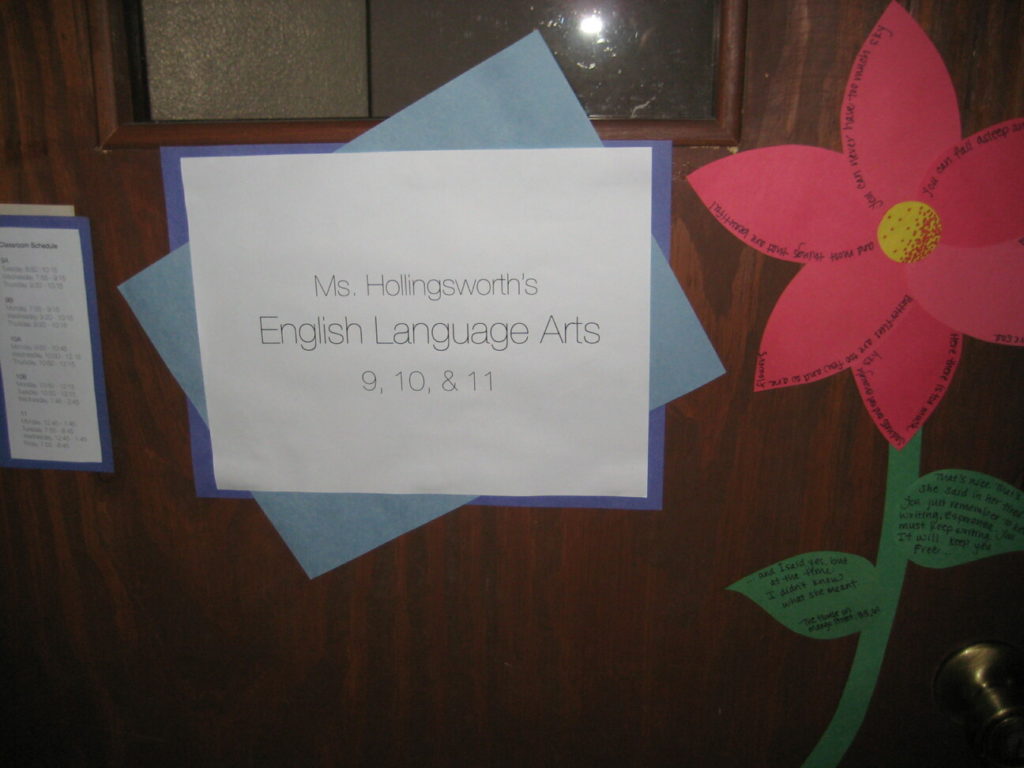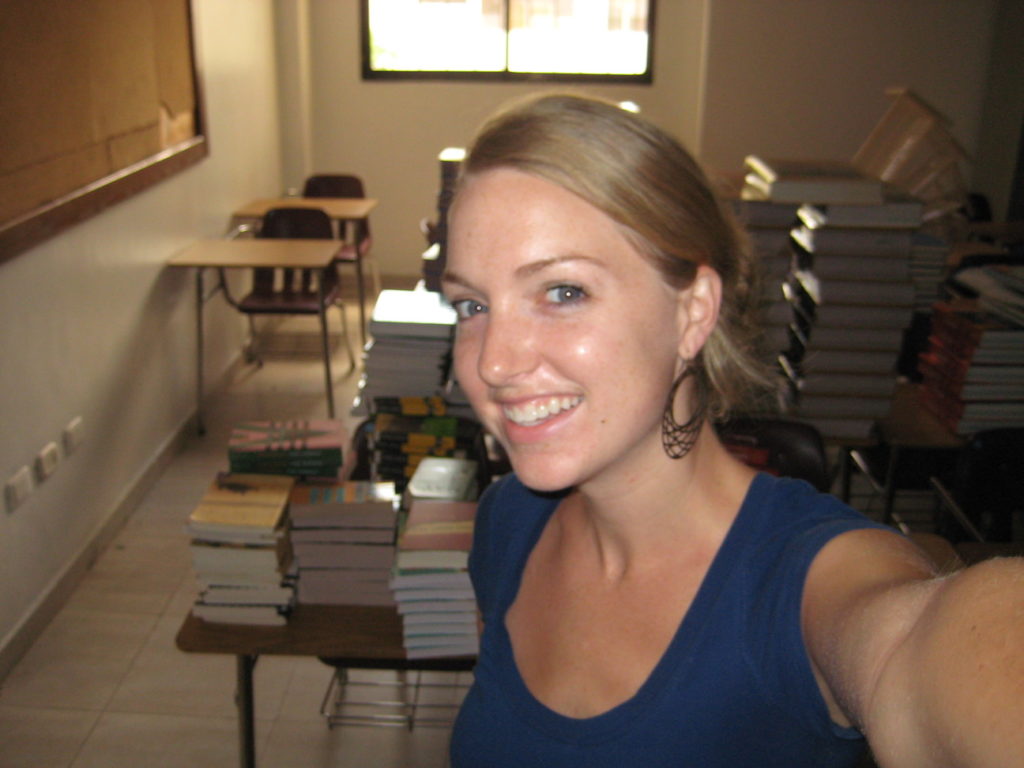 At eight years old, I was sitting in my second grade classroom when I got the news.
At eight years old, I was sitting in my second grade classroom when I got the news.
“Congratulations, Stacy!” my teacher said, handing back the poem I’d submitted to a statewide poetry contest weeks prior. “You got second place!”
It didn’t matter that I hadn’t gotten first, or that my best friend at the time had won the entire competition, I had placed. Somebody out there, some nameless adult, had read my poem and decided it was second place material. They determined my words were worthy of recognition.
I looked at the neatly printed poem in my hands. To this day, I remember each word:
Mountains stand so very high
Way above the trees
They stand so high they touch the sky
Now that’s hard to believeThey’re blue with white right on the top
A very pretty view
I love those pretty mountains
From God to me and you
At eight, that poetry competition unlocked something within me. I was already a voracious reader, and had just completed my first full book series, The Chronicles of Narnia. After my second place prize, I became a voracious writer.
(If you’re curious about the Christianity theme, I went to a private Christian school through junior high.)
From second grade on, I set out on a mission to become a great writer. My school had an excellent English language arts program, and even in junior high, we had separate teachers for literature and English grammar, both of which required us to write but in different ways. Through my junior high education, I became adept at the English language and learned the structure of how to write college-level papers.
Outside of school, I devoured books. I read all day, every day. In elementary school, I’d listen at night for my parents to close their bedroom door, and then I’d flip on the cubby light on my waterbed (so ’90s!) and read Darcy the Detective and Nancy Drew. I fell in love with Robert Frost’s poetry. I wrote poems and in my journal.
In late elementary school, someone gifted us about 100 Baby-Sitter’s Club books, and I read all of them. Multiple times. I started my own babysitting “business” at ten and began babysitting for neighborhood kids. (As a parent, I can’t imagine allowing my own seven-year-old daughter to babysit in three years. How times have changed!)
In high school, I took honors English and extra creative writing classes. With boys, friends, and sports now occupying a lot of my time I didn’t read as much, but I still read more than pretty much anyone I knew (other than my best friend!). While I didn’t take AP English because I graduated high school a semester early, I was able to build on the foundation that had been set in junior high. I learned not to use cliches in my storytelling and to show, not tell. I learned how to build suspense in readers, and how to write a love story. I learned about great poetry and literature, and what makes it great.
I also got on my teacher’s nerves because I questioned everything. I remember in honor’s English, discussing The Old Man and the Sea, and my teacher talking about how great it was. At the time, I didn’t get it and questioned why it was great and who said so and what makes their opinion valid. I annoyed my teacher, but underneath my questions was curiosity: What makes great writing great? How could I be great? What did it take to become a great writer? Could I be like those writers someday?
Of course, we were studying nearly all white male authors in high school. I didn’t see much of myself in them. But I wanted to understand what made their writing beloved by so many.
It’s no surprise that I pursued a bachelor’s in writing in college, with a minor in art (I also took extra art classes all through high school). Thanks to my ACT scores, I received credits for my first year of English. I signed up for junior- and senior-level classes my first year. I took literary theory and poetry and every class I could to immerse myself in words and art. I fell in love with Chicana writing, and read more books by female authors and writers of color. I got my first professional writing internship at the on-campus alumni magazine, working with a woman who would become a dear mentor and friend. I graduated magna cum laude with my bachelor’s in writing.
After college, my husband and I moved to the Dominican Republic, where I taught high school English language arts at an international school. There again, I focused on writing and reading, hoping to inspire in my students the same love affair with English I’d had my entire life. I started a writing and editing freelance business on the side, which I cheekily called Freelancexpat.

The door to my classroom in the Dominican Republic! The next school year, I made an elaborate The Little Prince display.
Eventually, we moved to Vietnam, where I taught English as a second language. I kept building my business, eventually landing my first writing project, then my first editing project. I applied to grad school and got in with a full-ride research assistantship at a scientific journal. My husband and I packed our belongings and moved to Boise for the summer, where I continued building my business—I often edited and wrote for ten to twelve hours a day, six days a week—and also helped found a local magazine.
In July of 2011, two days after getting married, my husband and I moved to Cincinnati to continue my education.
Any guess what I studied? Yep, writing. Specifically, professional writing and editing.
Being at graduate school was incredible. In undergrad, there is so much focus on exams and proving that you’d done the work. In grad school, professors seemed to assume the best of us. We were given space for discourse and exploration. We played with technology and worked with real clients. One project for the Irish Heritage Center of Cincinnati was especially exciting because we got to go down to the center and interview our clients to understand their needs, then design a poster for an upcoming event from scratch.
I learned that becoming a professional writer wasn’t just about the words but also about the experience. While I didn’t want to become a graphic designer, I needed to understand the interplay of words and graphics. This lesson would serve me well later on when I worked in the magazine world.
I was still building my business on the side and was using what I had learned to do better work for my clients. One of my major clients was a business in Idaho that published Healthy Living Made Simple, a Sam’s Club publication. I had been promoted to a bigger position at the publication and knew there might be a greater opportunity for me at the magazine if I were local. After talking with my clients at length, I spoke with my advisor and moved back to Boise with a plan to cobble together credits at Boise State University and distance learning at the University of Cincinnati.
About two weeks before we left, I found out I was pregnant. That threw our plans a bit, but we had already decided to move home, so we went.
Moving turned out to be a great decision, because not long after we arrived, I was promoted to managing editor and eventually executive editor. The magazine had 11 million readers, so it was an honor and huge responsibility to run the publication.
While I finished my graduate degree (which took four years instead of two, since I was working full time and now a mom), I continued my work with my client and his business partner, who was a Nobel Prize winner in medicine. Over the course of our work together, I wrote probably 1,000+ pieces of content and a book, and eventually my first book, The Editor’s Eye. I walked the stage in my cap and gown in 2015, very pregnant with our second child.
Over the next several years, I would go on to ghostwrite, write, and edit many more books, and to impact hundreds, if not thousands, of books through coaching, training, and content.
All this time and all these years, I’ve kept in mind a singular goal for my business and our life as a family: freedom and flexibility. Control over my life and my time. Even with the big job as executive editor of a giant national publication, even writing for a Nobel Prize winner, even working with clients all over the country, even traveling the world, I’ve worked when I wanted. And I’ve worked hard.
But I did it my way.
Never in my journey did I picture myself as a staff writer. To me, that felt like it would strip away what I love about writing. Writing is about flow and connection. It’s about being all-in on the page, immersing yourself completely in language, removing the barrier between your brain and fingers. I can’t imagine doing that in a cubicle or even a corner office.
I think this freedom to work at home, and to write when it works for me, is why I’ve maintained my love for writing.
I’ll fast forward to today: we’ve lived in Thailand and now live in Portugal. I coach people writing their books, ghostwrite books, write articles for my site, and host a podcast. I coauthored a book with Ron Price that hit #1 bestseller. I’ve designed, and am about to launch, a book coaching program to help more future authors fall in love with writing, and to experience the power of presence on the page.
My love story with writing grows over time. It gets stronger and deeper. But, of course, I have my moments. Don’t we all? There are times when I’m sick of writing, when I want nothing more than to shut my computer and go on a run or take the day off. Sometimes I do just that, because I recognize the difference between laziness and needing a break. Even when I fall out of love for a day or week (or three), I always fall right back in.
And when I’m feeling stuck or discouraged, I close my eyes and bring myself back to that moment, way back in second grade, when my teacher handed back my prize-winning poem. I still feel it today: joy, excitement, encouragement, validation.
Pride. Accomplishment. Love.
How about you? What’s your love story with writing? Or maybe you love art, business, piloting, boating—tell me about the thing that lights you up, and why. I love reading your stories!

I had an English teacher for my sophomore and junior years in high school. He was considered, by many parents including mine, to not be a suitable individual to be teaching. He was single, rode a motorcycle and hung out in a bar that a lot of ex-students of his went to. I remember I was playing French horn in the high school band and the first chair player was graduating which meant my junior year I would be first chair. The director was a horrible person not emotionally fit to teach high schoolers. He was mean and demanding and I was not looking forward to the next year. I asked my English teacher what I should do as I really wanted to play percussion and was not going to make a career of music so the next year I did not want to face the tyranny the director forced upon people. He told me anyone could pound a drum but the French horn was an art. I told him I had no interest in the high school band but had been writing a few short stories here and there and felt I might have something he would be interested in. I remeber he had a sign on the wall that said, “Has to do with”. He would go crazy if anyone in class ever started out a story or conversation with it. He told me to write a short story that was brand new and he would go over it with me. I wrote a totally off the wall story and submitted it to him. He was so impressed he went to the school paper and demanded it be printed in the paper. He told me to go beat the Hell out of the drums and never stop writing. I have lost a lot of my spontaneity over the years but will never forget his encouragement. I still have that ridiculous short story and wonder where the inspiration came from.
Wow! What a story. I feel like you need to frame the quote: “Beat the hell out of the drums and never stop writing.” So good—and clearly inspiring for you. Thank you for sharing!
My sixth grade teacher lit a fire under me for writing. Actually I loved writing long before that time, composing poems here and there for homemade birthday cards. But in the sixth grade our teacher assigned each of us to write a poem, then stand up in front of the class and read it. When I read mine she smiled and said, “Whoever said sixth graders can’t write poetry!” This was a teacher who handed out compliments sparingly, so I knew she meant it. Then when a county newspaper person came to my high school and asked them to recommend someone to write a monthly column, someone recommended me. I was thrilled! That branched out into different types of writing–music, poetry, magazine and newspaper articles. I’ve loved writing all those genres. It’s my panacea at times. When I’m happy, I write. When I’m sad, I write. I still write personal letters to friends. Probably not a day goes by that I don’t write something.
Aren’t teachers amazing? I love your story about reading your poem in class, and your teacher’s reaction. I bet you remember it like it was yesterday! 🙂 Like you, I had teachers along the way who recognized my love of language and encouraged me. I even wrote about one of those teachers in my first book. Thank you for sharing!
I’ve been writing professionally for almost 20 years, but I didn’t grow up wanting to become a writer. My first love was music. I came home from first grade one day and told my mom that I wanted to take piano lessons after hearing some other kids perform for the class. I started flute in fourth grade. The details are hazy with the passage of time, but some frustration made me think of quitting flute when I was 13. I remember shoving my flute to the back of the top shelf of my closet and closing the door. I immediately burst into tears. On the senior page of my college yearbook I wrote, “engineering may become my profession but music will be with me all my life.” Thirty years later, what is one thing I miss most during the four months of lockdown? No longer being able to play music with others. I still play the flute, piccolo, and alto sax at home, but it’s not the same.
What a beautiful story, Julia. Thank you for sharing. We each have those moments and experiences that stick with us, and it seems like playing music is that for you. I hope you are able to play with others again soon.
[…] reading my latest blog post about how I fell, and stayed, in love with writing. Read the post at https://stacyennis.com/writinglove. Connect with me and send your questions for a future episode at http://stacye1.sg-host.com. […]